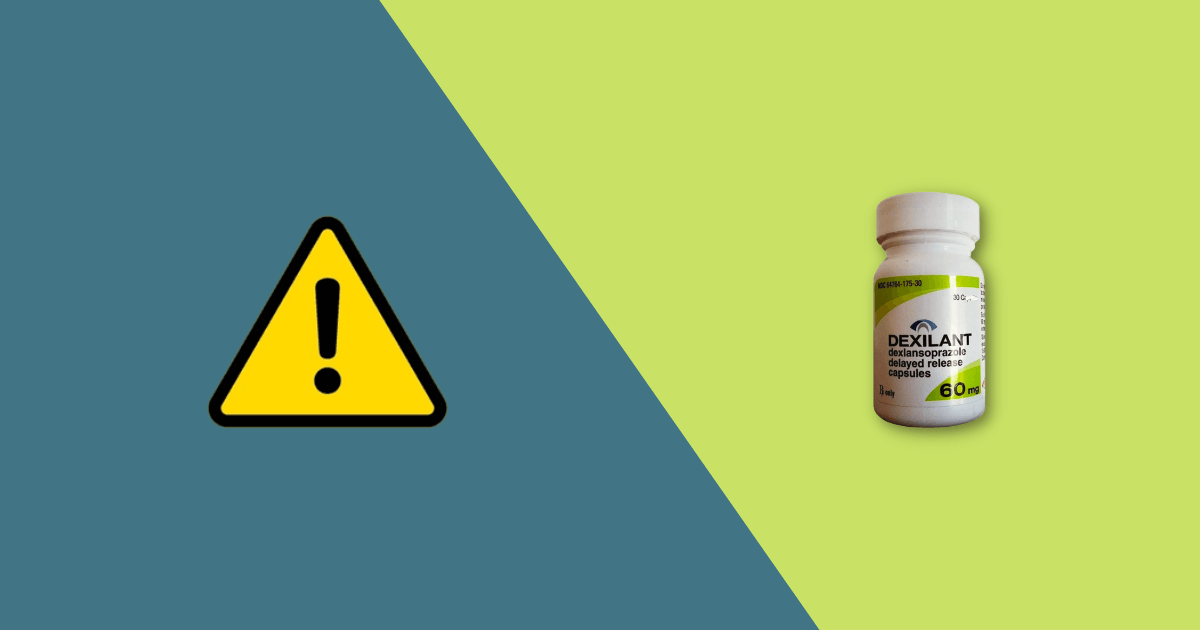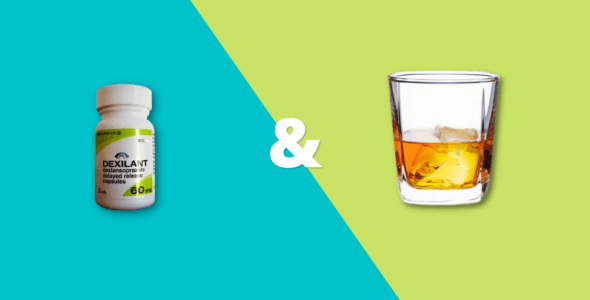Dexilant side effects and how to avoid them
Table of contents
Dexilant is a brand-name medication manufactured by Takeda Pharmaceuticals. It is classed as a proton pump inhibitor (PPI) and is used to heal erosive esophagitis (EE), provide heartburn relief, and treat GERD in adults and children 12 years of age and older. While Dexilant is generally well tolerated, there are some potential side effects that people should be aware of. The most common side effects of Dexilant include stomach pain and diarrhea. Less common, but more serious side effects, can include serious allergic reactions.
Learn more about the side effects of Dexilant and what you can do to avoid them.
What is Dexilant (dexlansoprazole)?
Dexilant is approved by the U.S. Food and Drug Administration (FDA) for:
- Healing of erosive esophagitis (inflammation of the esophagus)
- Maintaining healing of EE and relief of heartburn
- Treating heartburn associated with symptomatic non-erosive gastroesophageal reflux disease (GERD)
Dexilant is a proton pump inhibitor that contains the active ingredient dexlansoprazole. It reduces stomach acid secretion by binding and inhibiting the hydrogen-potassium ATPase pump (gastric proton pump) found within the parietal cells of your stomach. This allows peptic ulcers to heal as well as reduces symptoms of gastroesophageal reflux disease (GERD).
More information on what is Dexilant
Dexilant dosage
Dexilant is available as delayed-release capsules in strengths of 30mg and 60mg.
- Take Dexilant exactly as prescribed by your healthcare provider. Do not stop taking Dexilant without talking to your doctor first
- Dexilant can be taken with or without food
- Swallow Dexilant capsules whole. If you have trouble swallowing Dexilant capsules, you can open the capsules and sprinkle the contents on a tablespoon of applesauce. Be sure to swallow the applesauce mixture right away. Do not chew the mixture
- If you miss a dose of Dexilant, take it immediately. However, if it is almost time for your next dose, skip the missed dose and return to your regular schedule. Do not use an extra dose to make up for the missed dose
- If you take too much Dexilant, call your doctor immediately or go to the nearest hospital or emergency room
- Dexliant is a pregnancy category B as there are no adequate and well-controlled studies with dexlansoprazole in pregnant women. Discuss the risks of taking Dexilant while pregnant with your healthcare provider
- It is not known whether Dexilant is excreted in breast milk. It was found in rat milk during animal studies. Discuss with your healthcare provider if you should remain on Dexilant while breastfeeding
- Read the Instructions for use and medication guide with drug information that comes with your Dexilant prescription
- Store Dexilant at room temperature between 68°F to 77°F (20°C to 25°C)
You are advised to read the medication guide provided with this medicine for the drug information and patient information, and always speak with your healthcare provider for medical advice about any changes to your dose so they can monitor and evaluate your condition.
More information on Dexilant Dosage
Dexilant side effects
The most common possible side effects of Dexilant include:
- Diarrhea
- Stomach pain
- Nausea
- Upper respiratory tract infections
- Vomiting
- Flatulence (gas)
Some serious side effects of Dexilant include:
- Severe diarrhea that may be due to Clostridium difficile
- Bone fracture
- Low magnesium levels
- Lupus erythematosus
- Serious allergic reactions (rash, face swelling, throat tightness, difficulty breathing)
If you experience any of these serious side effects, stop taking Dexilant and seek medical attention immediately. You are encouraged to report negative side effects of prescription drugs to the FDA. Visit www.fda.gov/medwatch, or call 1-800-FDA-1088.
What are the side effects of Dexilant on the stomach?
Common side effects of Dexilant on the stomach include stomach pain, stomach cramps, diarrhea, and gas. These side effects are more common in children.
Dexilant long-term side effects
You should always check with your doctor or pharmacist before taking any medication, including Dexilant, to make sure it is safe for you. Long-term use of Dexilant may cause further complications.
- Stomach cancer – Some symptoms of acid reflux and heartburn can be due to stomach cancer. Notify your doctor if your symptoms don’t resolve while taking Dexilant or come back quickly after stopping this medication
- Clostridium difficile-associated diarrhea – Dexilant can cause an increased risk of Clostridium difficile-associated diarrhea
- Bone Fracture – Long-term Dexilant therapy may cause an increased risk for osteoporosis-related fractures of the hip, wrist, or spine
- Vitamin B12 deficiency and magnesium low levels – Decreased magnesium and vitamin B12 levels have been reported rarely with prolonged treatment with drugs like Dexilant
- Long-term use of Dexilant may make it harder for your body to absorb vitamin B12
- Dexilant can cause kidney problems – symptoms may include fever, rash, nausea, loss of appetite, joint pain, urinating less frequently, blood in your urine, weight gain
- Cutaneous or systemic lupus erythematosus may occur or worsen in patients receiving Dexilant. Notify your healthcare provider if you have joint pain or a skin rash that gets worse when exposed to the sun
Is Dexilant hard on the kidneys?
Dexilant may cause acute interstitial nephritis. This is inflammation of the kidney that can cause acute kidney failure or chronic kidney disease.
Is Dexilant a safe drug?
Dexilant is not recommended for use in children 2 years of age and younger. Long-term use of Dexilant may make you more prone to bone fractures.
What happens when you stop taking Dexilant?
Your symptoms of heartburn may return if you stop taking Dexilant. Your doctor may reduce your dose slowly over a period of several weeks to stop this from happening.
What is a good substitute for Dexilant?
There are other medications to treat heart failure that your healthcare professional can prescribe if Dexilant is not the right medication for you. Some FDA-approved alternative treatment options include:
- Prilosec (omeprazole)
- Prevacid (lansoprazole)
- Nexium (esomeprazole)
When is the best time to take Dexilant?
Dexilant is best taken orally once daily, with or without food.
What is the difference between Dexilant and Nexium?
Dexilant is used in people with erosive esophagitis or symptoms of (GERD). Nexium is used in people with GERD, erosive esophagitis, heartburn, Helicobacter pylori infections, and conditions such as Zollinger-Ellison syndrome. Both can be used in adults and children. Dexilant is recommended for use in children 12 to 17 years of age. Nexium is recommended for use in children aged 1 to 17 years of age. Dexilant contains dexlansoprazole, Nexium contains esomeprazole as the active ingredient. Both drugs are classed as proton pump inhibitors.
Dexilant drug interactions
Dexilant can interact with other medications including:
When Dexilant is taken with other medications, they may interact and change how they work. It may also increase the severity of certain side effects or make them more likely to occur. Make sure your doctor is aware of all the medications you take, including prescription drugs, over-the-counter medications, vitamins, and herbal supplements. Some major drug interactions with Dexilant include:
- Atazanavir should not be taken with Dexilent because atazanavir concentrations may be decreased
- Dexilant may interfere with the absorption of pH-dependent drugs such as ampicillin, digoxin, itraconazole, ketoconazole, erlotinib, dasatinib, nilotinib, mycophenolate mofetil, and iron
- Patients taking warfarin may require regular monitoring for increased bleeding times
- Taking tacrolimus with Dexilant may increase tacrolimus blood concentrations
- Dexilant may increase serum levels of methotrexate
- St. John’s wort and rifampin can decrease the amount of Dexilant in your body
- Dexilant may reduce the antiviral effect of some antiretroviral drugs such as rilpivirine, atazanavir, and nelfinavir
How to avoid Dexilant side effects
The best way to avoid side effects is to take Dexilant as directed by your doctor. Follow your doctor’s instructions carefully and do not take more or less than prescribed.
If you experience any side effects, talk to your doctor or pharmacist. They may be able to recommend ways to help reduce or prevent some of the side effects.
1. Stick to the recommended dosage
Take your prescribed dose of Dexilant that has been recommended by your healthcare professional. Do not take more or less than prescribed.
2. Monitor your blood sugar levels
If you have diabetes, it is important to monitor your blood sugar levels closely while taking Dexilant. Check your blood sugar levels as directed by your doctor and report any changes to your doctor immediately.
3. Drink plenty of fluids
Drink eight to 10 glasses of water or fluids every day to help prevent dehydration, which can make side effects worse.
4. Avoid alcohol
Avoid drinking alcohol while taking Dexilant as it can increase your risk of side effects and gastrointestinal problems. Alcohol may also worsen the medical condition you are treating, such as heartburn caused by GERD and stomach ulcers.
5. Don’t skip meals
Eating regular meals and snacks will help to prevent low blood sugar levels (hypoglycemia).
6. Check your feet
If you have diabetes, check your feet for any cuts, sores, or redness regularly. Tell your doctor if you experience any problems with your feet while taking Dexilant.
7. Know the signs and symptoms of Dexilant side effects
Signs and symptoms of side effects include diarrhea and stomach pain. If you experience any of these symptoms speak to your doctor for medical advice.
8. Monitor your weight
Weight gain is not normally a side effect of Dexilant. If you experience changes in your weight while taking Dexilant, get medical advice from your doctor.
9. Tell your doctor about all medications you’re taking
Be sure to tell your doctor about all other medications you’re taking, including over-the-counter drugs, vitamins, and herbal supplements, as they can interact with Dexilant.
10. Get regular medical check ups
It is important to get regular medical check ups and monitor your medical conditions. Your doctor will monitor your side effects and may adjust your dose of Dexilant as needed.
Medically reviewed
A medical professional has reviewed this article.


Jamie Winn, PharmD
Jamie Winn, PharmD
Dr. Jamie Winn received his Doctor of Pharmacy in 2002 from the University of South Carolina College of Pharmacy, Columbia, SC. Jamie is a medical reviewer for NiceRx.


